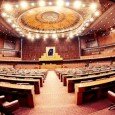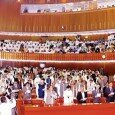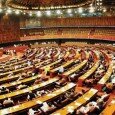Pique Report –
Whether you call it laxness on part of the parliamentarians or lack of accountability in Pakistan’s parliamentary or political system but it is a fact that around a dozen special parliamentary committees have either become dysfunctional or failed to accomplish the task assigned to them by the house.
The most glaring but disappointing example of the parliamentarians’ easy-going approach vis-à-vis running the affairs of parliamentary committees particularly ‘special committees’ is the virtual failure of Special Committee on Law and Order Situation in Karachi (Sindh) and Quetta (Balochistan) which despite the passage of nine months has yet not come up with any suggestion to bring peace in these restive regions of the country while it was mandated by the house for the submission of a report within two months.
The National Assembly on August 12, 2011 unanimously adopted a motion to form a special parliamentary committee comprising members of all parliamentary parties to review the law and order situation in Karachi and Quetta and report within two months. In pursuance of a unanimously adopted motion, National Assembly Speaker Dr Fehmida Mirza on August 28, 2011 constituted a 17-member all-party special parliamentary committee on Karachi and Balochistan.
Woodrow Wilson, the 28th President of the United States, was quoted as saying in 1885 that “Congress in its committee rooms is at work”. But, one can say after seeing the performance of Pakistani special parliamentary committees that “Parliament in its committee rooms is not at work”. Whenever the Supreme Court takes suo moto notice of any issue or any petitioner approaches the court (as Nawaz Sharif did in the much-trumpeted Memo case), the top government functionaries come into action at once to create the impression of a clash between the institutions. They claim that one institution of the state is trespassing on another institution’s constitutional ambit and the supremacy of the parliament is being eroded. But, on the other hand, the manner in which the parliament and its bodies are being run by the government/lawmakers expose the reality behind PPP leaders’ claims of being champions of the supremacy of the parliament.
Shockingly, four members of the special committee on unrest in Karachi and Quetta belonging to the leading opposition party – the Pakistan Muslim League-Nawaz – including Sardar Mehtab Abbasi, Khwaja Mohammad Asif, Zahid Hamid and Rana Tanvir Hussain have also not raised the issue of the committee’s go-slow on preparing recommendations to establish peace in the two restive parts of the country.
PPP MNA Nasir Ali Shah from Quetta, who raised the issue of the target killings of people from the Hazara community in the house last year, says that it is unfortunate to note that the committee has yet not proposed any remedial measure to check the target killings in Balochistan despite the passage of nine months. “The committee has even not visited Quetta yet … The committee has just proved to be a show-piece … When the government does not want to resolve any issue, the matter is handed over to the committees,” Nasir Shah laments.
The special parliamentary committee has also failed to woo angry Baloch leaders for talks. On October 13, 2011, the committee in its last meeting had pledged that it would visit Quetta and meet the disgruntled Baloch elders and other stakeholders to get first-hand information about the ground realities and then it would deliberate about how to establish peace in the province. It had also resolved to contact the Baloch leaders in exile in this regard but the plan is yet to be implemented.
Commenting on the sluggish attitude of the committee, Sardar Yaqoob Khan Nasir, PML-N MNA from Balochistan said that the government had not accorded due respect to the parliament. “The PPP government in the last three-and-a-half years did not act upon any parliamentary resolution … The decisions of parliamentary standing committees are not implemented by the executives … The incumbent government of so-called democrats is worse than the rule of the dictator Musharraf,” he said, adding that it was this lackadaisical attitude of the PPP that had forced Nawaz Sharif to knock the Supreme Court’s door in the memo case.
Another 17-member special panel was formed in October last year after the opposition parties went on a week-long protest in the National Assembly about prolonged power outages and called for setting up of a special committee to look into the causes of the energy crisis and suggest measures to overcome it. The government accepted the proposal and the house adopted a motion to form a special committee for the purpose. The committee was supposed to submit its report before the next session of the National Assembly starting on November 14 but no progress in this regard has been witnessed so far while the people are facing the worst ever power outages and the country, the worst ever demonstrations against loadshedding.
Usman Khan Tarakai, the chairman of the special parliamentary committee on power crisis, does not agree with the perception that the committee has failed to come up with a concrete set of recommendations on tackling the energy crisis. “We have been giving recommendations to the ministry of water and power from time to time in the last few months … The actual issue is their implementation,” Tarakai says.
Someone once said: “A committee is a group of men who individually can do nothing, but collectively can meet and decide that nothing can be done.” Same is the case with the special parliamentary committee on implementation of the All Parties Conference’s resolution headed by Raja Pervaiz Ashraf which has now become completely dysfunctional. It is pertinent to mention that the committee was constituted, though with due procrastination in mid November 2011, under a unanimous resolution passed by the All Parties Conference hosted by Prime Minister Yousaf Raza Gilani on September 29, 2011 in the wake of the US threats to Pakistan to launch a full-scale military offensive against the Haqqani network in North Waziristan.
It was agreed in the unanimous resolution signed by the treasury and opposition parties that “a parliamentary committee will be formed to oversee the implementation of earlier resolutions as well as this resolution and progress on the same will be made public on monthly basis.” Interestingly, contrary to the spirit of above mentioned clause of the APC resolution which bounds the committee to make progress on implementation of the 13-point resolution public, the parliamentary panel has failed to come up with any such report despite the lapse of many months.
The committee is composed of MNAs Raja Pervez Ashraf (Chairman), Nadeem Afzal Chan, Dr Ayatullah Durrani, Khwaja Mohammad Asif, Sardar Mehtab Ahmad Khan, Dr Attiya Inayatullah, Syed Haider Abbas Rizvi, Bushra Gohar, Maulana Attaur Rehman, Haji Khuda Bux Rajar and Munir Khan Orakzai. A member of the committee said that the constitution of the committee was itself against the spirit of APC resolution as only members of the National Assembly were inducted into it without any representation from the Senate while the APC resolution had demanded a ‘parliamentary committee’.
Frustrated with slow-response from concerned authorities and functional overlapping of two parliamentary panels, the chairman and members of Special Parliamentary Committee on Implementation of APC resolutions have asked the Speaker to merge their committee with the Parliamentary Committee on National Security headed by Senator Raza Rabbani.
In some cases, the special committees of parliament did not even meet for months, let alone discuss the issues and resolve them. The speaker formed another special committee to review the prices of petroleum products on February 15, 2012 but this committee too failed to come up to people’s expectations and could not any exercise parliamentary control on POL prices.
Khurram Dastgir Khan, PML-N MNA and member Special Parliamentary Committee on POL prices, thinks that the government is paralyzed and is hence unable to make policies on crucial matters. “For face saving, it shifts responsibility to the parliament and its bodies and, at the end of the day, it also does not accept or implement recommendations of the parliament and its august committees,” Khurram says. The PML-N lawmaker is satisfied with the functioning of parliamentary committees and blames the government for non-implementation of parliamentary decisions.
Some other special parliamentary committees formed by the Speaker National Assembly including Special Committee on Delay in PIA Flights (including Haj flights and grounding of PIA aircrafts), Special Committee on Millennium Development Goals (MDGs), Special Committee on Threats to Journalists and Media Personnel have also failed to meet deadlines in finalizing and tabling their reports before the house.
The fate of another recently formed Special Parliamentary Committee on Missing Persons in terms of its usefulness will not be different from other committees. This is obvious from the fact that, since its formation on May 14, 2012, it has yet not elected its chairman. The formation of the committee also took two months as the house adopted the resolution for the formation of special parliamentary committee on March 14, 2012.
Lt General (retd) Abdul Qadir Baloch, PML-N MNA from Balochistan also reiterates the belief that the fate of the Special Parliamentary Committee on Missing Persons in terms of performance will not be different from other committees. “Various government departments do not consider themselves answerable to the parliament and its committees therefore these parliamentary bodies fail to deliver ,” says Baloch.































































































